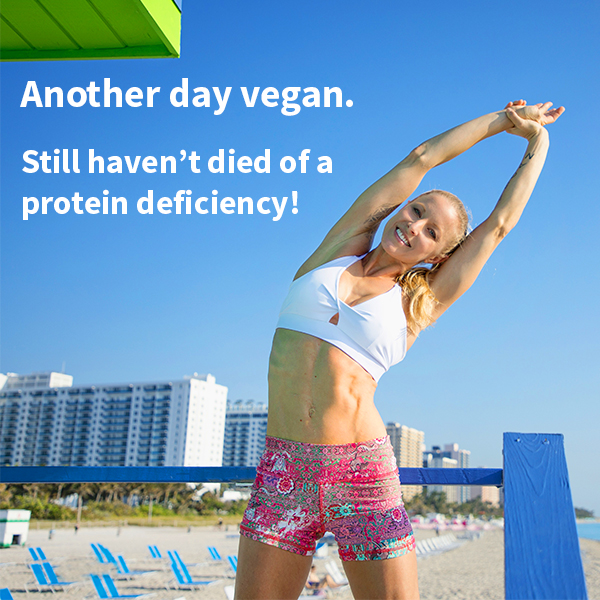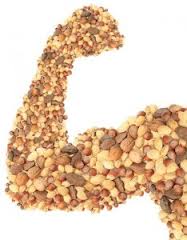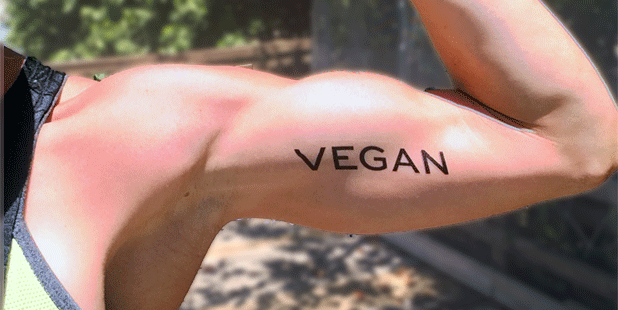If you haven’t gotten it already, be prepared to hear, “How do you get protein on a vegan diet?” when you inform someone that you are vegan or making the transition.
It’s a reasonable question (many people still do not know the answer) and its helpful to have an “elevator pitch” of sorts prepared in response.
So check this out… I ‘m in the line at Whole Foods, and the lady behind me asks, “Wow, I want to know what you do to have legs like that!” I reply, “Well thank you! Besides kickboxing & the variety of workouts I do, I am vegan and eat a plant exclusive diet which keeps me in the best possible shape!”
‘m in the line at Whole Foods, and the lady behind me asks, “Wow, I want to know what you do to have legs like that!” I reply, “Well thank you! Besides kickboxing & the variety of workouts I do, I am vegan and eat a plant exclusive diet which keeps me in the best possible shape!”
The lady immediately asks, “But you have great muscle definition… Being vegan, how do you get protein?” My answer, “Its simple! I get plenty of the top quality protein found in vegetables, fruit, nuts, seeds, peas, beans, quinoa, and other whole grains. By cutting out animal products that are harmful to our health (not to mention animals and the environment), I am full of energy and look and feel my best!”
The point of this silly little story is that it’s important not only to learn about plant-based nutrition for yourself, but also to help spread the word and let other people know how you get protein from plants. Its a good deed to say the least, and necessary to spread awareness and ultimately save people’s (and animal’s) lives!
What’s the problem with high protein diets?
Think about this… How many people do you know personally who have died specifically from a lack of protein? For most Americans, the number is ZERO!
Now think… How many people do you know who have died from heart disease, stroke, or complications from obesity? Probably dozens right?! These diseases are linked to excess animal protein.
One of the main reasons diets high in animal protein can be detrimental is that high protein diets are generally low in fiber.
Some benefits of fiber include:
- Blood sugar control
- Heart health
- Stroke prevention
- Weight loss and management
- Skin health
- Diverticulitis prevention
- Hemorrhoid prevention
- IBS relief
- Gallstones and kidney stone prevention
What is the recommended protein intake for overall health?
I teach clients how to eat intuitively out of love and respect for themselves, animals, and the Planet, which means we don’t count calories or track macros in the Plant-Empowered Coaching Program.
That being said, it can be helpful to have a general idea about protein intake at the beginning, when you’re working on getting into a food routine that is in line with your values and your goals.
The RDA (recommended daily allowance) of protein in grams can be calculated using the following equation:
Body weight (lbs.) x .36
Using the formula, a 140 pound person requires 50.4 grams of protein per day to be healthy.
If you’re wanting to gain lean muscle however (I’m NOT talking to the level of bodybuilding here), you may want to intermittently up that number. The following equation may work:
Body weight (lbs.) x .5
In this case, a 140 lb person should consume 70 grams of protein per day.
That all being said, every BODY is different. Some people build lean muscle quicker and easier than others. Some people need more protein than others to feel their best. This is why we focus on intuitive eating in the Plant-Empowered Coaching Program.
How do you meet your protein requirements on a vegan diet?
It’s easier than you may think to take in plenty of protein on plants alone! Here comes you’re proof…
Let’s take a look at a day’s sample vegan meal plan:
- Breakfast: Oatmeal (1 C cooked oatmeal, 1 C flax milk, 1 TBSP hemp seeds, 7 walnuts
- Snack Post-Workout: Powerootz Nutritional Superfood Shake (12 oz unsweetened nut milk, 1 serving nutritional powder)
- Midday: Salad (1 C spinach, ½ a tomato, ½ C garbanzo beans, ½ C lentils, ½ an avocado, 3 TBSP unhulled sesame seeds
- Dinner: Sushi Restaurant (1 C edamame, 1 vegetable roll with brown rice)
Can you guess how many grams of protein this sample vegan meal plan contains?
85 grams of plant protein! And just FYI, this menu provides 110% RDA of iron, 100% RDA of calcium, and 161% RDA of fiber… Not bad eh?
How do you get “complete protein” on a vegan diet?
One myth is that you need to eat all the essential amino acids (building blocks of protein) at the same meal. You don’t! As long as you get all 9 essential amino acids over the course of the day you’re good to go. This chart references what plants, when combined, give you complete protein:

Basically, and this is what I tell all my clients, as long as you’re eating a wide variety of plant foods (vegetables, legumes, nuts, seeds, whole grains) you will be getting your requirement for all 9 essential amino acids on a daily basis. (Read more about vegan nutrition as a whole if you want to know more about creating a balanced vegan diet plan.)
What are some quick and convenient ways to supplement extra protein?
If you want to get extra protein so that you can build more lean muscle, but you don’t think you can do it with whole foods alone every day, a high quality plant-based protein powder can be used to supplement.
Powerootz Superfood Nutritional Shake is honestly the only protein powder I actually enjoy. When Lisa Hunt, the founder, sent me out samples over a year ago I fell in love immediately. I’m super picky with any sort of powders but she truly got the formula right with her products. My absolute favorite flavor is Peanut Butter Bliss, but the Vanilla and Cacao Mania (both of which are also raw) are also great.
I am now affiliated with Powerootz, so if you place an order, be sure to use the code “ELLA” at checkout for 10% off!
There are vegan protein bars, like the 22 Days Protein Bar and Cliff Builder Bars, some of which are more whole foods based than others so make sure you read the ingredients carefully for added junk.
 There’s also a product I started to use just recently that has made a noticeable difference in my performance while working out. I’m always skeptical with all types of supplements, but after doing the research, and listening to the doctor who formulated it speak, I am convinced it’s the “real deal.”
There’s also a product I started to use just recently that has made a noticeable difference in my performance while working out. I’m always skeptical with all types of supplements, but after doing the research, and listening to the doctor who formulated it speak, I am convinced it’s the “real deal.”
The product is called “MAP® (Master Amino Acid Profile). These tablets are composed of a unique pattern of amino acids in a highly purified, free, crystalline form that’s absorbed quickly (23 min) and effectively. This supplement contains zero inactive ingredients and is great for optimizing muscle endurance, mass, strength, and improve/speed muscle recovery. I am not affiliated with this product, but like I said, I believe in it so I’m sharing it with you. MAP is available on Amazon among other online retailers.
Personal Note
In case you haven’t read my bio, I’d like to share that I’ve been vegan for 24 of my 39 years, and vegetarian for 32 years (since I was 7). This means I’ve built my physique on plant protein. I consider myself a walking vegan muscle experiment and the results are proof that you DO NOT need animal protein to build a muscular, strong body.
In 2007 I competed in the FAME World Championships and took 1st place in the bikini division, 2nd in the fitness model and fitness categories. Competing is definitely not “my thing” but I’m so glad I went through with a competition to show the world that a vegan diet plan is the way to go for a strong, lean, healthy body!
Conclusion
So there you have it… pretty much everything you need to know to put together a vegan meal plan with plenty of protein!
Also, I invite you to receive dozens of free training videos that will help you on your journey… Simply click HERE for access.
Ella Magers, MSW
Latest posts by Ella Magers, MSW (see all)
- The Highs, the Lows, and Finding Peace in the Pause - January 17, 2025
- When Crisis Calls: Finding Peace in Purposeful Action - January 10, 2025
- Fierce Compassion: Guide to Grieving, Celebrating, and Living Fully - January 7, 2025
- Your 30-Second Health Hack for the New Year: “Greens Insurance” - December 27, 2024
- Manifesting Your Best Year: The Art of Setting Soulful Intentions - December 27, 2024


“Forks over Knives” really is a powerful documentary with important information for everyone who wants to make informed choices about what they eat.
what a great article on proteins for vegans, incredibly helpful, thanks ella
I love sun warrior protein! Thanks for recommending Ella! I also totally agree with getting protein from foods other than
meat. I get most of my protein from quinoa, Edamme, sun warrior protein with almond milk, banana and blueberries.There are also a lot of great meat substitutes out there now that actually taste really good! And, tofu gets a bad rap as there are a lot of great tofu recipes.
I’ve trained with Ella and I’ve learned a lot
about healthy eating and how to maintain a healthy lifestyle and still have fun and eat stuff I like!
I hope you are sharing all this with your friends and family Carrie. It sounds like you have made some really positive changes in your lifestyle that are working great for you!
Having grown up as a normal meat and potatoes kind of guy I used to think that I couldn’t get protein anywhere but from meat. As I have grown wiser and started to listen to my body I find that I respond much better to vegan protein supplements. I feel less gastric distress and my energy levels are much higher. Vega is my choice these days.
Thanks for sharing Cody, I think you speak for a lot of guys out there. And Vega’s Performance Protein is a great product and easy way to boost your daily protein intake for building lean muscle.
Ella, the cartoon at the top is perfect! Why are people so focused on protein (as if protein deficiencies are a big problem among shoppers at Whole Foods!) when so many of our most common health problems can be resolved by avoiding animal products!
Thank you for helping people realize that vegan living is healthy — and that we never have to feel “deprived!”
Thank you for the Ronni… it really is amazing how much emphasis is put on making sure we get enough protein, when animal protein is exactly what is making us sick!!!
I would love to be Vegan, but I am always afraid if I don’t get dairy products my bones will crumble. Can you explain that for me. TY
Kay, this is a very common misconception… I’m so glad you asked me 🙂 Please watch this short video explanation from reputable physician Dr. Michael Gregor, who has devoted his life to promoting wellness by making all the unbiased research available to the general population! https://nutritionfacts.org/video/is-milk-good-for-our-bones/
Let me know what you think!
Also, the documentary Forks Over Knives, https://www.forksoverknives.com/the-film/ is a must-see for you to get a really good understanding on all the health aspects of a plant-based diet.
Pingback: Fine! I'll tell you where I get my protein from! | Vegan Diet Plan | Going Vegan | Vegan Fitness
I have seen the detailed reports of metals and contaminates in protein powder including the vegan protein powder listed above. It was a few years ago but this can be found easily on a Google search. Can someone have the same results of they choose to just eat plants? Without tofu and protein powder? What is the ratio of protein 10%? 15%?
Hi Liz, thanks for the comment. Yes, you absolutely can get plenty of protein without using any supplements or soy products. The ideal ratio can be different for different people. People’s bodies run differently, and it depends on what your goals are (how much lean muscle you would like to put on). If you focus on eating a large variety of whole plant foods, including veggies, fruit, legumes, nuts, seeds, and whole grains, chances are you will build a healthy, strong body. The one supplement that is “a must” is B12. I hope that helps!